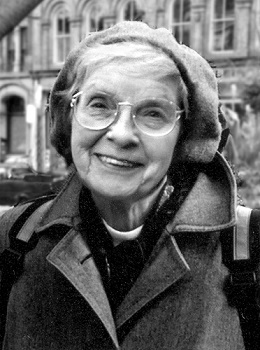De Canadese dichteres en schrijfster Margaret Avison OC werd geboren op 23 april 1918 in Galt, Cambridge, Ontario. Avison studeerde van 1936 tot 1940 te studeren aan het Victoria College van de Universiteit van Toronto, waar ze afstudeerde met een Bachelor of Arts (BA). Ze begon haar schrijfcarrière in 1939 met een gedicht in Canadian Poetry Magazine en werkte tussen 1940 en 1945 voor de North American Life Insurance Company, de Gage Press en bij het Canadian Institute of International Affairs. Haar vroege poëzie werd ook opgenomen in AJM Smiths baanbrekende bloemlezing “The Book of Canadian Poetry”, gepubliceerd in 1943. Avison, die tussen 1945 en 1955 als administrateur en bibliothecaris werkte aan de bibliotheek van de Universiteit van Toronto, schreef boeken over een verscheidenheid aan onderwerpen, zoals “History of Ontario” (1951), een leerboek voor middelbare scholen over de geschiedenis van Ontario. Na creatief schrijven te hebben gestudeerd aan de Universiteit van Indiana en de Universiteit van Chicago, ontving ze in 1956 een Guggenheim Fellowship. Voor haar eerste dichtbundel, “Winter Sun” (1960), ontving ze de Governor General’s Award, de meest prestigieuze literaire prijs van Canada. Haar daaropvolgende werken omvatten een medische biografie en samenwerking aan “The Plough and the Pen: Writings from Hungary 1930-1956” (1963), een vertaling uit de Hongaarse taal. In 1963 nam Margaret Avison, die zich dat jaar ook tot het christendom bekeerde, deel aan een poëzieconferentie georganiseerd door Warren Tallman en zijn vrouw Ellen King, samen met Denise Levertov, Charles Olson, Allen Ginsberg, Robert Duncan en Philip Whalen. In 1964 behaalde ze een Master of Arts (MA) aan de Universiteit van Toronto met een proefschrift over de stijl van Byron’s Don Juan in relatie tot de krant van zijn tijd. In 1966 publiceerde Avison “The Dumbfounding”, een toegankelijk verslag van spirituele ontdekkingen en een inzichtelijk verslag van het ontmaskerde, verhalende ‘ik’. Tussen 1967 en 1968 was ze docent aan het Scarborough College van de Universiteit van Toronto en werkte vervolgens tot 1973 als maatschappelijk werkster voor de Presbyterian Church Mission in Toronto, voordat ze vanaf 1973 gedurende acht maanden writer in residence was aan de University of Western Ontario. De stijl die in “The Dumbfounding” werd gebruikt, werd verder ontwikkeld in “Sunblue” (1978). In 1990 ontving ze voor de tweede keer de Governor General’s Award voor “No Time”. In 1994 verscheen “A Kind of Perseverance”, een verzameling van haar lezingen aan universiteiten. Ze ontving in 2003 de prestigieuze Griffin Poetry Prize voor haar bundel “Concrete and Wild Carrot” uit 2002. Naast haar driedelige verzamelde werken gepubliceerd tussen 2003 en 2005, publiceerde ze in 2006 een verzameling nieuwe gedichten onder de titel “Momentary Dark. Margaret Avision werd o.a. geëerd met het Officer’s Cross of the Order of Canada (OC) en de Leslie K. Tarr Award.
Birth Day
Saturday I ran to Mytilene.
Bushes and grass along the glass-still way
Were all dabbled with rain
And the road reeled with shattered skies.
Towards noon an inky, petulant wind
Ravelled the pools, and rinsed the black grass round them.
Gulls were up in the late afternoon
And the air gleamed and billowed
And broadcast flung astringent spray
All swordy-silver.
I saw the hills lie brown and vast and passive.
The men of Mytilene waited restive
Until the yellow melt of sun.
I shouted out my news as I sped towards them
That all, rejoicing, could go down to dark.
All nests, with all moist downy young
Blinking and gulping daylight; and all lambs
Four-braced in straw, shivering and mild;
And the first blood-root up from the ravaged beaches
Of the old equinox; and frangible robins’ blue
Teethed right around to sun:
These first we loudly hymned;
And then
The hour of genesis
When the first moody firmament
Swam out of Arctic chaos,
Orbed solidly as the huge frame for this
Cramped little swaddled creature’s coming forth
To slowly, foolishly, marvellously
Discover a unique estate, held wrapt
Away from all men else, which to embrace
Our world would have to stretch and swell with strangeness.
This made us smile, and laugh at last. There was
Rejoicing all night long in Mytilene.
HIATUS
The weedy light through the uncurtained glass
Finds foreign space where the piano was,
And mournful airs from the propped-open door
Follow forlorn shreds of excelsior.
Though the towel droops with sad significance
All else is gone; one last reviewing glance,
One last misplacing, finding of the key,
And the last steps echo, and fade, and die.
Then, wanderer, with a hundred things to see to,
Scores of decisions waiting on your veto,
Or worse, being made at random till you come
So weeks will pass before you feel at home,
Mover unmoved, how can you choose this hour
To prowl at large around a hardware store?
When you have puchased the superfluous wrench
You wander still, and watch the late sun drench
The fruit-stalls, pavements, shoppers, cars, as though
All were invisible and safe but you.
But in your mind’s ear now resounds the din
Of friends who’ve come to help you settle in,
And your thoughts fumble, as you start the car,
On whether somebody marked the barrel where the glasses are.

